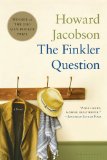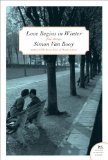Summary | Excerpt | Reading Guide | Reviews | Beyond the book | Read-Alikes | Genres & Themes | Author Bio

From the book jacket: A long-lost book reappears,
mysteriously connecting an old man searching for his son and a
girl seeking a cure for her widowed mother's loneliness.
Leo Gursky's life is about surviving, tapping his radiator each
evening to let his upstairs neighbor know he's still alive. But
life wasn't always like this: sixty years ago, in the Polish
village where he was born, he fell in love and wrote a book. And
though he doesn't know it, that book survived, inspiring fabulous
circumstances, even love. Fourteen-year-old Alma was named after a
character in that very book. And although she has her hands
full—keeping track of her brother, Bird (who thinks he might be
the Messiah), and taking copious notes on How to Survive in the
Wild—she undertakes an adventure to find her namesake and save her
family.
Comment: Krauss says that The History of Love was inspired by
her four grandparents (it is partially dedicated to "My
grandparents, who taught me the opposite of disappearing.") and by a pantheon of authors whose work is
haunted by loss—Bruno Schulz, Franz Kafka, Isaac Babel, and more.
Book rights have already been sold in at least 20 countries.
When asked how she found the right voice for Leo
Gursky, she says, 'It was easy in that I just wasn't looking
for it, or him. One day I had his voice in my head, and I started
writing, and it turned out to be the beginning of the novel.
Honestly, he feels like me. It was never a stretch to write in his
voice; I never sat around scratching my head, wondering what he'd
think or how he'd say something.....When I started, I'd decided to
write a book with no plot. Devising plots didn't seem like my
strength, which didn't bother me too much, since the books I love
generally don't depend on them. For a long time all I had was
Leo's voice. Then Alma's. I had these little bits of The History
of Love which I didn't know yet were going to become a book within
a book--they were just vignettes.'
Note: Do not confuse Nicola Krause, co-author of The Nanny
Diaries with Nicole Krauss, author of This History of Love
- they are two very different people and two very different books!
![]() This review was originally published in The BookBrowse Review in June 2005, and has been updated for the
May 2006 edition.
Click here to go to this issue.
This review was originally published in The BookBrowse Review in June 2005, and has been updated for the
May 2006 edition.
Click here to go to this issue.

If you liked The History of Love, try these:

by Howard Jacobson
Published 2010
The Finkler Question is a scorching story of friendship and loss, exclusion and belonging, and of the wisdom and humanity of maturity. Funny, furious, unflinching, this extraordinary novel shows one of our finest writers at his brilliant best.

by Simon Van Booy
Published 2009
On the verge of giving up—anchored to dreams that never came true and to people who have long since disappeared from their lives—Van Booy's characters walk the streets of these stark and beautiful stories until chance meetings with strangers force them to face responsibility for lives they thought had continued on without them.
To be ignorant of what occurred before you were born is to remain always a child
Click Here to find out who said this, as well as discovering other famous literary quotes!
Your guide toexceptional books
BookBrowse seeks out and recommends the best in contemporary fiction and nonfiction—books that not only engage and entertain but also deepen our understanding of ourselves and the world around us.